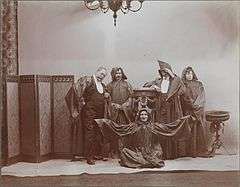Byron Company
The Byron Company is a New York City photography studio in Manhattan that was founded in 1892.[1][2][3] It is "one of New York's pre-eminent commercial photography studios" that "documented the essence of New York City life".[4][5] Percy Byron, the son of the founder, was "the premier maritime photography of his generation".[6]

History
Joseph Byron was born in London in 1847 to a commercial photographer, and he opened the Byron Company in Manhattan in 1892.[1] He took on as his partner his son, Percy Claude Byron.[3] Since 1917 Percy specialized in maritime photography and lived on Staten Island.[7][8] Byron died in 1923, and Percy died in 1959.[7] In 1942 Percy closed the family studio because of World War II. He then went to work for the Essex Art Engraving Company of Newark, New Jersey until he retired in December 1958 because of his ill health.[7]
Legacy
The descendants operate as Byron Photography with 7th generation photographer, Thomas Byron and his son, 8th generation photographer, Mark Byron.[3]
Archive
- 24,175 photos at the Museum of the City of New York taken between 1890 and 1942.[9]
References
- "The Apple". New York Daily News. May 17, 1999. Retrieved 2009-02-12.
The Byron family came to New York from England in 1888. Once here, Joseph Byron began taking photos for newspapers and doing other freelance projects before opening his own studio in 1892. ... His son Percy became interested in ocean liners, cultivating the crews of the great ships the way his father had done with theater people, and was made the official photographer of the maiden voyage of the legendary Normandie in 1935. Several of his images are in the show.
- Kramer, Hilton (November 3, 1976). "Photos Recall a Mercantile City". The New York Times. Retrieved 2009-02-11.
The Byron Company, a commercial photographic firm that prospered in New York ...
- "Byron Photography". Byron Photography. Archived from the original on 2010-05-28. Retrieved 2009-02-10.
Founded by Joseph Byron (1847-1923), the son of an English commercial photographer, the Byron Company of New York specialized at first in making still photographs of theatrical productions and later, under the leadership of Joseph's son Percy (1878-1959), in photographing ships, especially big ocean liners. Together, this father and son team documented the turn of the century in New York City.
- "Playing In The Neighborhood". The New York Times. April 11, 1999. Retrieved 2009-02-11.
From stage photography to society event portraits and then ship photography, the Byron Company documented the essence of New York City life from the turn of the century until the beginning of World War II.
- "Gotham Comes of Age". The New York Times. September 10, 1999. Retrieved 2009-02-11.
The 70 photographs here, all made by the Byron Company, one of New York's pre-eminent commercial photography studios from 1892 to 1942, reflect a wide range of New York life and culture, from Fifth Avenue Gilded Age mansions to Hester Street slums, from curling on Central Park Lake to female workers making salad dressing at the E. R. Durkee factory in Elmhurst, Queens.
- "Joseph Byron". University of South Carolina. Retrieved 2009-02-10.
He loved New York's docks and instilled this love in Percy, who became the premier maritime photography of his generation.
- "Percy Byron Dies. Photographer, 80. Recorder of Turn-of-Century New York Scenes Aided in 'Once Upon a City'". The New York Times. July 11, 1959.
It stood then either for Joseph Byron, the father, or Percy Byron, the son. ... Since 1917, Mr. Byron had made the photography of ships his specialty. ...
- World War I draft registration
- "MCNY Collections Portal". Museum of the City of New York. Retrieved 2017-03-14.
Enter 'Byron Company (New York, N.Y.)' in 'Advanced Search' box for access to over 24,000 photographs of New York City and its environs taken by the Byron Company between 1890 and 1942.